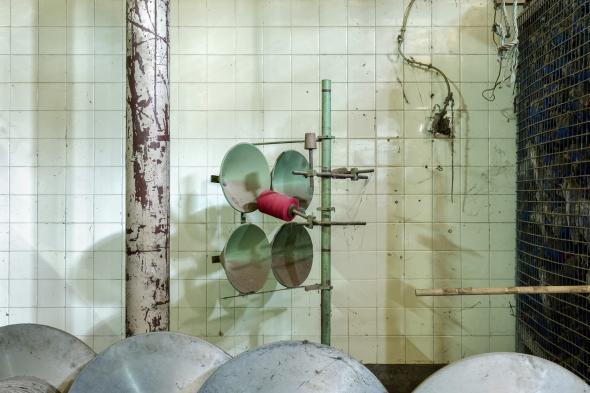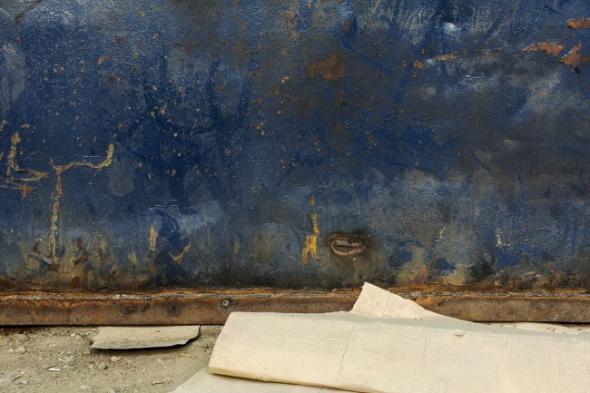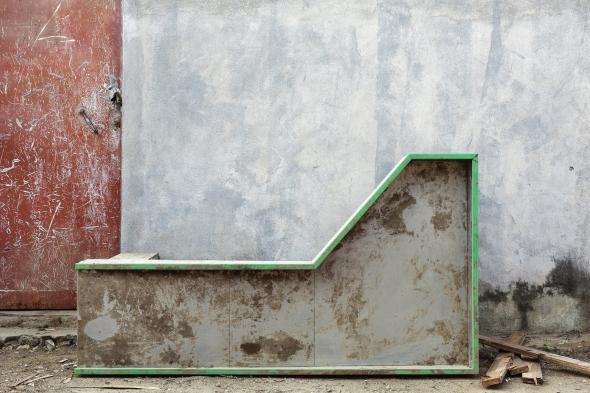Matter, Memory and Machine: The Politics and Poetics of the Gaze in Edson Chagas’ ‘Factory of Disposable Feelings’
The solo show ‘Edson Chagas: Factory of Disposable Feelings’ presents one of the most recent photographic series by Edson Chagas (Angola, 1977), made in the Cazenga neighbourhood, in Luanda, Angola, between 2017 and 2018. Having previously been shown solo only in Cape Town, South Africa, in 2019, the series ‘Factory of Disposable Feelings’ appears now for the first time in Lisbon in a new configuration, including images that have never been exhibited.
 Edson Chagas. 'Factory of Disposable Feelings'
Edson Chagas. 'Factory of Disposable Feelings'
This series continues the investigations that singularise Chagas’ work, namely the attention to the experiential and affective relationships that subjects establish with everyday objects and spaces, countering fast rhythms of consumption through a decelerated gaze that closely scrutinises discarded materials, shapes and textures. However, the series simultaneously marks a kind of turning point, insofar as, unlike previous series carried out in various urban public spaces to the North and South, vaguely identified (the streets and beaches of Luanda, Venice, London and Newport, etc.), in this series, for the first time, the photographer focused on the indoors and outdoors of a specific architecture. This is the Irmãos Carneiro Factory in Cazenga, in Luanda, an old textile factory founded in the colonial period, which, belonging to a Portuguese-Angolan family, continued to operate after Angola’s independence and during the various phases of the civil war (1975-2002), producing sheets, diapers and military uniforms, etc. More recently, it has been redirected to the production of agricultural tools, having been partially abandoned.
Through his own bodily and affective experience of this space, and through conversations not only with its owners but mainly with its former workers, some of whom became security guards in the building after the factory closed down, Chagas composed a kind of portrait in open sequence, simultaneously intimate and dialogic, of a multiple place: situated somewhere between the particularities of this architecture and the extended dynamics of the neighbourhood, the city and the country; between collective history and individual memory; between the concrete objectivity of matter and machine (both the factory’s and the photographer’s, i.e. the camera) and the subjectivity of experience and the gaze. The intensity of the lived experiences shared by the former workers imbued with memory the space and its objects, which, although evincing loss, were transmuted into affective archives, poetically exceeding the limits of the visible and documentable.
 Edson Chagas. 'Factory of Disposable Feelings'
Edson Chagas. 'Factory of Disposable Feelings'
The use of the close-up invites a paused and attentive observation of concrete material conditions: the details of inscriptions on doors, walls or fabric; the fractures of wear and tear; the fragility of fall and abandonment; the enduring solidity accumulated in apparent chaos or isolated survival; the linear tension of interrupted threads; the circular wait of intact rolls; the faint curves of cables and machines; grids, gates and a decisive glimpse of the sky; still structures evoking a desire for flight; expectant geometries of colour and dust. In fact, the attention to detail inherent to the close-up is also what gives it an abstracting quality; an abstraction which, at times, seems to translate into an almost pictorial two-dimensionality, soon countered by the play of shadows and textures unveiling the variations in volume and matter of different surfaces in space. From such an angle, the objects seem to acquire a life of their own; whilst the spectator is offered the poetic possibility of, as happened to the photographer, listening to the imagined murmur of the countless stories that such objects harbour. In line with various cosmologies within which objects refuse to inhabit exclusively the domain of the inert, the marketable and the exhibitable, being animated by life and becoming repositories for spiritualities and lived experiences, memories and longings, these objects exceed the narrative of uselessness and spoil that was attributed to them by the failures of industry and commerce. Beyond the relational singularity depicted in each image, the serial strategy also allowed Chagas to gather a wider community of objects in dialogue with each other.
However, between matter and memory (the memory inscribed in matter and the psychic matter of memory itself), the machine (of both factory and photography) does not allow us to abstract from Luanda, Angola and their placement in the world. By scrutinising the particularities of this factory, Chagas examined the multiple times and spaces of the Angolan present: the enduring legacies of the colonial period (with more than a decade of liberation struggle, 1961-1974), the failed dreams of post-independence, the long civil war during and after the Cold War, oligarchic capitalism and globalisation, which, in the last decades, has flooded the country with western and eastern goods; namely textiles which, coming from supposed Western aid or competitive Chinese production, annihilate any chance of survival for the Angolan textile industry. Yet, by spending time listening to the former workers, it was to them and their personal vision of history that Chagas gave prominence and value.
Symbol of the very country on hold and of the various projects of supposed modernity and modernisation that have marked its history, the abandoned factory has never ceased to be reoccupied, reappropriated and reactivated by an active labour of memory and desire, including past and present futurities that are yet to be fulfilled.
 Edson Chagas. 'Factory of Disposable Feelings'
Edson Chagas. 'Factory of Disposable Feelings'